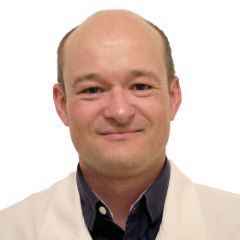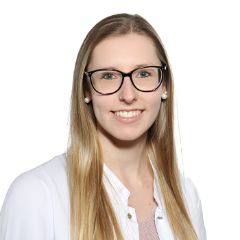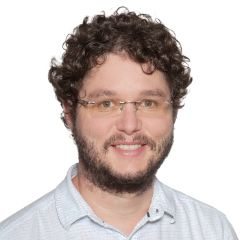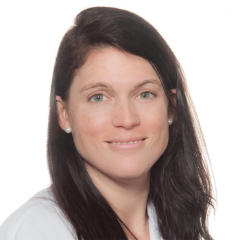Clinical bacteriology and mycology
The Department of Clinical Bacteriology/Mycology specializes in the diagnosis of infectious diseases caused by bacteria and fungi. The department covers the fields of bacteriology, mycobacteriology, mycology, molecular diagnostics, infection serology and hospital hygiene examinations.
Our range of tests is also used by other hospitals, doctors' surgeries and other diagnostic laboratories. Around 150,000 test materials are processed each year. Our laboratory works in close collaboration with the Clinic for Infectiology and Hospital Hygiene. We are also very actively involved in teaching and research at the University of Basel and the University Hospital Basel.
Address and contact
University Hospital Basel
Clinical Microbiology
Petersgraben 4
CH-4031 Basel
Phone +41 61 265 42 20
Fax +41 61 265 46 00
Opening hours
Monday-Friday: 8.00 a.m. - 6.00 p.m.
Saturday: 8.00 a.m. - 12.00 p.m.
Sunday: 8.00 a.m. - 12.00 p.m.
Management
Academic management

Dr. Peter Michael Keller
Fachleiter Klinische Bakteriologie und Mykologie
Labormedizin
Tel. +41 61 55 65749
Team leader
Basic diagnostics
Bacterial pathogens are detected microscopically and in culture from a wide range of test materials (blood, urine, stool, smears, secretions, punctates and tissue). An automated blood culture system (Virtuo) and two MALDI-TOF mass spectrometers are available for the rapid detection of bacteria and fungi in blood. We routinely test the sensitivity of isolated pathogens to up to 28 antibiotics to enable doctors to administer targeted antibiotic therapy and monitor the resistance situation. The minimum inhibitory concentration (MIC) of 40 antimicrobial substances can be determined on request.
Depending on the problem, we offer special cultures for various challenging pathogens or pathogen groups.
Detailed information can be found in our analysis directory. If you have any questions, please contact the person responsible.
Responsible for Molecular Diagnostics

Dr. Claudia Lang
Fachverantwortliche Allgemeine Bakteriologie, Mykobakteriologie, Mykologie
Labormedizin
Tel. +41 61 55 65165
Team leader
Judith Heckendorn
Mycobacteriology
At the University Hospital Basel, we detect around 50 new infections with Mycobacterium tuberculosis and 50 new infections with atypical, non-tuberculous mycobacteria every year. We have a modern biosafety level 3 laboratory at our disposal for this purpose.
In addition to microscopic and cultural methods for identification, we also offer phenotypic resistance testing against INH, rifampicin, ethambutol, pyrazinamide and streptomycin. We also have the option of using molecular diagnostic methods (PCR and gene probes) and whole genome sequencing to type bacteria (accredited) and genotypically determine resistance to antibiotics.
Detailed information can be found in our analysis directory. If you have any questions, please contact the person responsible.
Specialist responsible for mycobacteriology

Dr. Claudia Lang
Fachverantwortliche Allgemeine Bakteriologie, Mykobakteriologie, Mykologie
Labormedizin
Tel. +41 61 55 65165
Team leader
Mycology
Due to the high number of immunosuppressed patients, for example after allogeneic stem cell transplantation, we have extensive experience in fungal diagnostics. We also carry out a wide range of modern dermatophyte diagnostics for dermatological issues. In addition to microscopic methods, we also use mass spectrometry and modern molecular diagnostic methods for identification.
In the case of yeasts and molds, we have the option of testing selected antifungal substances for resistance and determining the minimum inhibitory concentration.
Detailed information can be found in our analysis directory. If you have any questions, please contact the person responsible.
Responsible for mycology

Dr. Claudia Lang
Fachverantwortliche Allgemeine Bakteriologie, Mykobakteriologie, Mykologie
Labormedizin
Tel. +41 61 55 65165
Team leader
Molecular diagnostics
We have a range of species-specific PCRs available for detection from clinical samples - Aspergillus and Mucorales-specific PCR methods in particular can provide valuable information in the diagnosis of immunocompromised patients. Further specialties are the detection of Chlamydia trachomatis serovar L1 to L3 and L2b, the pathogen of Lymphogranulonum venereum. eubacterial PCR (parts of the 16S gene) and panfungal PCR (IST region) are suitable for the further identification of pathogens.
In addition to the detection of specific pathogens, we also offer the detection of bacterial toxins, e.g. diphtheria toxin and specific resistance genes, e.g. carbapenemases.
As a new method, we also have the possibility to examine bacteria and fungi by means of Whole Genome Sequencing in the routine. This allows isolates to be typed and resistance mechanisms and virulence factors to be genotyped.
Detailed information can be found in our analysis directory. If you have any questions, please contact the person responsible.
Responsible for Molecular Diagnostics

Dr. Peter Michael Keller
Fachleiter Klinische Bakteriologie und Mykologie
Labormedizin
Tel. +41 61 55 65749
Team leader
Infection serology
In cooperation with the Clinical Chemistry Department (technical implementation), we offer a wide range of antibody and antigen detections on a daily basis. For borrelia and treponema diagnostics, in addition to antibody detection, we also have the option of confirmation using Western blot methods.
You can find detailed information in our list of analyses. If you have any questions, please contact the person responsible.
Infection serology specialist
Team leader

Infection prevention investigations
We carry out a number of important infection prevention tests to ensure quality and patient safety at the university hospital. Screening for multi-resistant pathogens such as MRSA, ESBL- and carbapenemase-producing Gram-negative bacteria, vancomycin-resistant enterococci or Candida auris is carried out in accordance with the latest findings from the literature and our own investigations. We also offer airborne bacteria testing, endoscope examinations and autoclave inspections.
We have the latest methods at our disposal for typing the isolates. C. difficile is analyzed using ribotyping and all other bacteria are typed using Whole Genome Sequencing. We have a large epidemiological database at our disposal to compare the findings in an epidemiological context.
Detailed information can be found in our analysis directory. If you have any questions, please contact the person responsible.
Responsible for infection prevention investigations

Dr. Peter Michael Keller
Fachleiter Klinische Bakteriologie und Mykologie
Labormedizin
Tel. +41 61 55 65749
Team leader

Whole Genome Sequencing
The sequencing of the entire bacterial, fungal or viral genome ("whole genome sequencing") allows the high-resolution typing of outbreaks in an unprecedented way. The Department of Clinical Bacteriology and Mycology was the first microbiology laboratory in Switzerland to introduce this method into routine diagnostics within the ISO 17025 accreditation in 2016. We are constantly developing new methods and expanding our molecular epidemiology database with additional pathogens. The typing of nosocomial and public health relevant outbreaks is a particular focus of the department. In this context, we can draw on a large database that has already been sequenced, which allows classification in a broad epidemiological context.
In addition to routine applications such as typing, the focus is also on development and research: bioinformatic analysis pipelines enable the rapid detection of antibiotic resistance and virulence factors. We are also developing metagenomic applications.
Responsible for infection prevention investigations

Team leader
